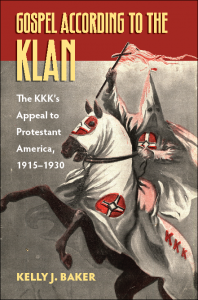 So, it begins. Gospel According to the Klan officially arrives on the shelf a short
So, it begins. Gospel According to the Klan officially arrives on the shelf a short two three months (math isn’t my strong suit) from today. In honor of its forthcoming publication, I have an op-ed up at the History News Network today on the protest and counterprotest at Arlington Cemetery on this past Memorial Day between the (in)famous Westboro Baptist Church and none other than a Virginia branch of Ku Klux Klan. Before anyone asks, no, I cannot make either of these movements bend to my will, so I didn’t set this up. Sometimes, I just get lucky when the news cycle moves into my scholarly territory. The question driving the op-ed is: Why does the news coverage of this event need a moral authority/arbiter/winner in the jockeying between WBC and the KKK?
Here’s a preview:
What does make the recent Arlington protest newsworthy is the presence of surprising counter protestors, the Ku Klux Klan (KKK). While WBC protestors held up signs proclaiming “Thank God for Dead Soldiers,” “Mourn for Your Sins,” and identifying President Obama as the Beast of Revelation, the Knights of the Southern Cross (Virginia) passed out small American flags to mourners. The Knights, led by self-proclaimed Imperial Wizard Dennis LaBonte, protested the WBC’s anti-troop message. In a sense, some media outlets were stumped by the face-off of two derided, defamed, and unloved groups. While WBC traces the history of the independent Baptist church back to 1955, the presence of the Klan in the American historical landscape can be traced back much further. The KKK first appeared in the 1860s with the Reconstruction Klan and emerged time and again in twentieth (the 1910s-1920s, 1950s-1960s, and 1980s) and now the twenty-first century with the rising presence of white supremacists after the election of Barack Obama to the presidency (2008). Unlikeability is perhaps the kindest way to discuss the WBC and the KKK, but that term obscures the violence, physical and rhetorical, that both enact. Both are grouped under the label “hate movement,” which account for the surprise at the KKK’s stance against the WBC.
Yet, it is only on the surface that KKK and the WBC appear similar. While the WBC gleefully notes the anger/hatred of God for the American nation in relationship to sexuality, the Klan, in each of its incarnations, embraces and promotes a white Christian nationalism. The nation for the Klan is sacred, and it requires constant vigilance to guarantee America’s status as the nation among nations, divinely ordained and guided. The 1920s Klan, in particular, further believed that God played an active role in American history, siding with white Protestants as the “true” chosen American people. While WBC’s protests equate dead soldiers with divine punishment, my historical work on the 1920s Klan showcases the order’s long attachment to the nation as well as the fear, not glee, that Americans could face divine retribution for declining social values. Of course, the Klan’s vision of nation still remains strictly limited to citizens with white faces, “correct” religious faith, Protestant Christianity, and heterosexuality. Unlike the WBC, the order’s patriotism demonstrates its deep attachment to the nation and mythologized American freedoms and values. Soldiers emerge as dually important for the Klan because of their role in the protection of the U.S. and the ability to honor individual Klansmen’s military service.
Continue reading here.
Racism begins with our failimes, parents, brothers and sisters, aunts and uncles, grandparents, people we admire, respect and love.However, as we grow and mature we come to the realization that what we were told by our family when we were children were slanted lies base on their prejudices. We realize that most people are like ourselves and not so different and want the same things, like a home, steady work, a Medicare plan and schools for our children (if you travel you will see this). We realize that most people are of good hearts and goodwill.This reminds me of a parable from the good book where a Levite and Priest come upon a man who fell among thieves and they both individually passed by and didn’t stop to help him.Finally a man of another race came by, he got down from his beast, decided not to be compassionate by proxy and got down with the injured man, administered first aid, and helped the man in need.Jesus ended up saying, this was the good man, this was the great man, because he had the capacity to project the “I” into the “thou,” and to be concerned about his fellow man.You see, the Levite and the Priest were afraid, they asked themselves, “If I stop to help this man, what will happen to me?”But then the Good Samaritan came by. And he reversed the question: “If I do not stop to help this man, what will happen to him?”That’s the question before us. The question is not, “If I stop to help our fellow man (immigrant) in need, what will happen to me?” The question is, “If I do not stop to help our fellow man, what will happen to him or her?” That’s the question.This current climate of blaming others for our woes is not new. We have had this before and we have conquered it.Remember “Evil flourishes when good men (and women) do nothing”. Raise your voices with those of us who believe we are equal and we can win this battle again.